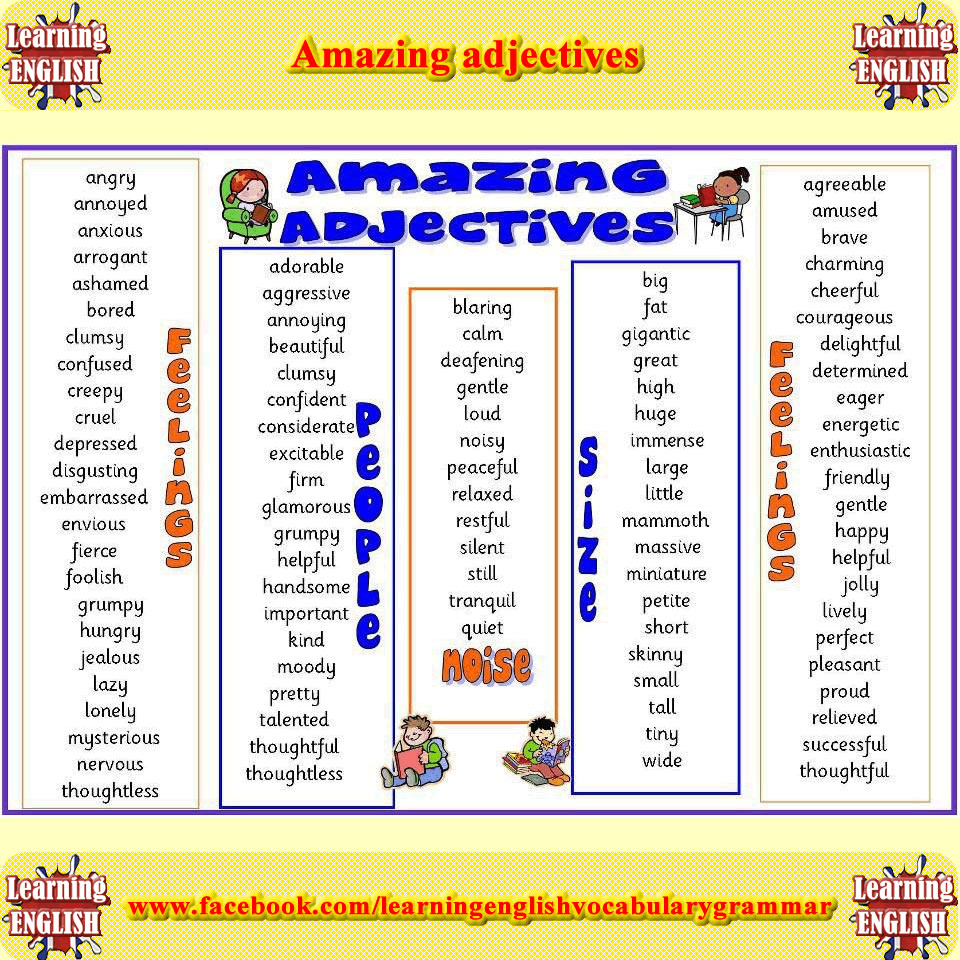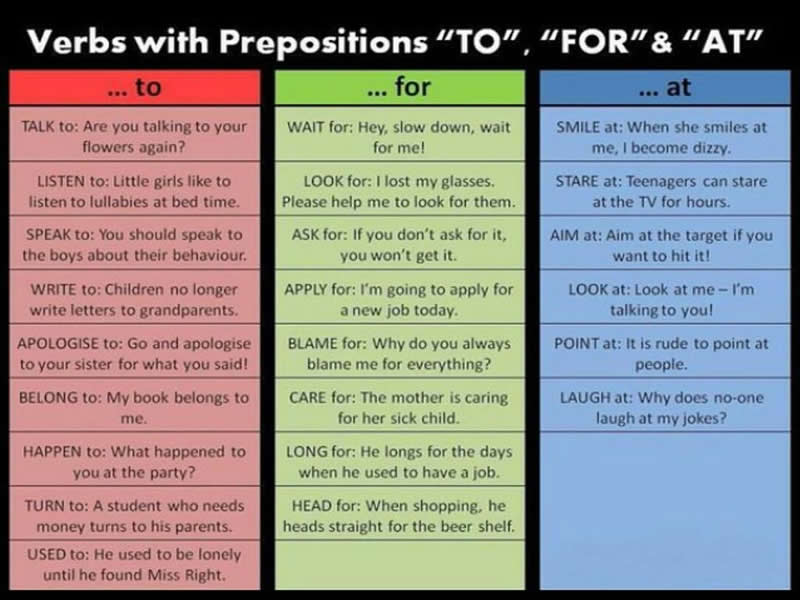Avoid using the word VERY because it’s lazy.
There are a few quotes that verify this idea and are stated below:
“Substitute ‘damn’ every time you’re inclined to write ‘very;’ your editor will delete it and the writing will be just as it should be. ~Mark Twain”
“‘Very’ is the most useless word in the English language and can always come out. More than useless, it is treacherous because it invariably weakens what it is intended to strengthen. ~Florence King”
“So avoid using the word ‘very’ because it’s lazy. A man is not very tired, he is exhausted. Don’t use very sad, use morose. Language was invented for one reason, boys – to woo women – and, in that endeavor, laziness will not do. It also won’t do in your essays. ~N.H. Kleinbaum”
One way to avoid using the word “very” is to use more descriptive words or phrases. For example, instead of saying “very tired,” you could say “exhausted.” Instead of saying “very happy,” you could say “overjoyed.” Additionally, you can use adverbs that are stronger than “very,” such as “completely,” “totally,” or “utterly.” Another way to avoid using “very” is to use a phrase that expresses the same thing in a different way, such as “to a great degree” instead of “very much” or “extremely” instead of “very”.
- Very cold -> Frigid
- Very tired -> Exhausted
- Very angry -> Furious
- Very happy -> Ecstatic
- Very cheap -> Inexpensive
- Very fast -> Swift
- Very big -> Enormous
- Very small -> Tiny
- Very hot -> Scorching
- Very cold -> Bitingly cold
- Very hungry -> Starving
- Very thirsty -> Parched
- Very dirty -> Filthy
- Very beautiful -> Gorgeous
- Very slow -> Tedious
- Very old -> Ancient
- Very high -> Lofty
- Very loud -> Deafening
- Very bright -> Radiant
- Very dark -> Pitch black
- Very long -> Interminable
- Very short -> Petite
- Very thin -> Skinny
- Very thick -> Chunky
- Very heavy -> Massive
- Very light -> Feathery
- Very fast -> Lightning fast
- Very slow -> Sluggish
- Very easy -> Effortless
- Very hard -> Herculean
- Very strong -> Robust
- Very weak -> Feeble
- Very sweet -> Saccharine
- Very sour -> Tart
- Very salty -> Briny
- Very bitter -> Harsh
- Very fresh -> Crisp
- Very stale -> Musty
- Very young -> Juvenile
- Very mature -> Sophisticated
- Very rich -> Opulent
- Very poor -> Destitute
- Very successful -> Triumphant
- Very failed -> Disastrous
- Very healthy -> Robust
- Very sick -> Infirm
- Very happy -> Elated
- Very sad -> Despondent
- Very pleased -> Delighted
- Very annoyed -> Irritated
- Extremely thin -> Gaunt
- Very quiet -> Hushed
- Very rude -> Impolite
- Very kind -> Benevolent
- Very nervous -> Anxious
- Very calm -> Serene
- Very hot -> Blazing
- Very cold -> Arctic
- Very rich -> Affluent
- Very poor -> Impoverished
- Very popular -> Trendy
- Very disliked -> Unpopular
- Very intelligent -> Brilliant
- Very silly -> Goofy
- Very serious -> Solemn
- Very playful -> Joyful
- Very boring -> Dull
- Very interesting -> Engaging
- Very simple -> Uncomplicated
- Very complicated -> Intricate
- Very wrong -> Incorrect
- Very right -> Correct
- Very fast -> Speedy
- Very slow -> Leisurely
- Very full -> Stuffed
- Very empty -> Vacant
- Very high -> Elevated
- Very low -> Depressed
- Very big -> Colossal
- Very small -> Minute
- Very hot -> Sweltering
- Very cold -> Frigid
- Very wide -> Spacious
- Very narrow -> Confined
Words to Use Instead of Very in Sentences
Here are some sentences using the words to instead of “very”:
- He was extremely cold. -> He was frigid.
- She was very tired. -> She was exhausted.
- The situation was very angry. -> The situation was furious.
- The party was very happy. -> The party was ecstatic.
- The item was very cheap. -> The item was inexpensive.
- The car was very fast. -> The car was swift.
- The building was very big. -> The building was enormous.
- The toy was very small. -> The toy was tiny.
- The day was very hot. -> The day was scorching.
- The night was very cold. -> The night was bitingly cold.
- He was very hungry. -> He was starving.
- She was very thirsty. -> She was parched.
- The room was very dirty. -> The room was filthy.
- The view was very beautiful. -> The view was gorgeous.
- The progress was very slow. -> The progress was tedious.
How to Avoid Using the Word Very | Image
Avoid Using the Word Very 1
Avoid Using the Word Very 2
Avoid Using the Word Very 3
Avoid Using the Word Very 4
Avoid Using the Word Very 5
Avoid Using the Word Very 6
Avoid Using the Word Very 7
Stop Saying Very
We use the word “very” to add emphasis to an adjective or adverb. People tend to use “very” over and over as it’s easy. However, there are always better alternatives to avoid using “very” and those words will help you sound more like a native speaker. Moreover, using very repeatedly in writing makes you seem dull and repetitive and lead to lower your score in exams such as IELTS and TOFEL. In this lesson, you’re going to learn how to stop saying very and enrich your English vocabulary.
Stop Saying Very!
Here is a list of 100 words to use instead of very to sound better in English;
100 Words to Avoid Using Very with Examples
- Very accurate = Exact
– They couldn’t find the exact cause of the accident. - Very afraid = Terrified
– She’s terrified of the dark. - Very angry = Furious
– My father was furious when I crashed his car. - Very bad = Awful
– The weather was awful yesterday. - Very beautiful = Gorgeous
– You look gorgeous as usual. - Very big = Massive
– We can’t afford such a massive house. - Very boring = Dull
– The book was so dull that I couldn’t finish it. - Very busy = Swamped
– I’ve been swamped with work recently. - Very calm = Serene
– She always smiles with that serene smile of her. - Very careful = Cautious
– She was cautious about what she ate. - Very cheap = Stingy
– He’s too stingy to take a taxi. - Very clean = Spotless
– She wanted me to keep the house spotless. - Very clear = Obvious
– It was quite obvious that he was guilty. - Very cold = Freezing
– Put on your jacket. It’s freezing outside. - Very colorful = Vibrant
– Hong Kong is a vibrant, fascinating city. - Very creative = Innovative
– He was a highly innovative artist in his time. - Very crowded = Bustling
– The pavements are bustling with people. - Very cute = Adorable
– Have you seen their new baby? She’s adorable. - Very dangerous = Perilous
– It’s perilous to drive fast when the roads are wet. - Very different = Disparate
– The four expirements gave quite disparate results. - Very difficult = Arduous
– It was a long and arduous journey. - Very dirty = Filthy
– I will have my car washed because it’s filthy. - Very dry = Arid
– The desert is so arid that nothing can grow there. - Very dull = Tedious
– His talents were wasted in his tedious job. - Very easy = Effortless
– She made playing the piano look effortless. - Very empty = Desolate
– The little mining town was desolate and ugly. - Very evil = Wicked
– It’s wicked to punish him for something he didn’t do. - Very excited = Thrilled
– Matthew was thrilled about becoming a father. - Very exciting = Exhilarating
– Riding roller coasters is an exhilarating experience. - Very expensive = Costly
– It would be too costly to repair your car. - Very fancy = Lavish
– He took me to a lavish restaurant for our anniversary. - Very fast = Quick
– She’s used to making quick decisions in a crises. - Very fat = Obese
– It’s very difficult for obese people to stop overeating. - Very friendly = Amiable
– He was such an amiable and decent man. - Very frightening = Terrifying
– It was the most terrifying experience of my life. - Very funny = Hilarious
– We laughed nonstop while watching the hilarious sitcom. - Very glad = Overjoyed
– Lisa was overjoyed when her boyfriend asked to marry her. - Very good = Excellent
– It’s quite an old car, but in excellent condition. - Very great = Terrific
– Everybody was having a terrific time at the party. - Very happy = Ecstatic
– The staff are ecstatic about the latest pay increase. - Very hard = Difficult
– It’s difficult to find a job during the pandemic. - Very hard-to-find = Rare
– My uncle’s interested in collecting rare stamps. - Very heavy = Leaden
– His eyelids were leaden with sleep. - Very hot = Sweltering
– It’s sweltering in here. Do you mind if I turn on the air conditioner? - Very huge = Colossal
– They asked a colossal amount of money for that house. - Very hungry = Starving
– I will get something to eat, I’m starving. - Very large = Huge
– We’re in competition with some huge companies. - Very lazy = Indolent
– He’s such an indolent man who does nothing but sleep. - Very little = Tiny
– The last time I saw her, she was just a tiny baby. - Very lively = Animated
– As he talked about her, his face became animated. - Very long = Extensive
– The flood caused extensive damage to the village. - Very loose = Slack
– Keep the rope slack until I tell you to pull it. - Very mean = Cruel
– Her treatment of the animal was cruel. - Very necessary = Essential
– Languages are an essential part of the school curriculum. - Very nervous = Apprehensive
– He was apprehensive about how to make his living. - Very nice = Kind
– It was kind of you to remember my birthday. - Very noisy = Deafening
– When he finished speaking, the applause was deafening. - Very often = Frequently
– She was frequently late for school. - Very old = Ancient
– Your computer is ancient. I think you should buy a new one. - Very open = Transparent
– She dressed a transparent silk blouse yesterday. - Very pale = Ashen
– Her ashen face showed how shocked she was. - Very poor = Destitute
– The floods left many people destitute. - Very pretty = Beautiful
– She’s the most beautiful girl I’ve ever seen. - Very quick = Rapid
– There’s a rapid growth in the use of the internet. - Very quiet = Hushed
– We discussed the situation in hushed voices. - Very rainy = Pouring
– It hasn’t stopped pouring for hours. - Very rich = Wealthy
– Lisa comes from a wealthy family. - Very sad = Sorrowful
– She had a sorrowful look on her face. - Very scary = Chilling
– They’re nervous about the chilling effect of inflation. - Very serious = Grave
– Many species of animals are in grave danger of dying out. - Very sharp = Keen
– You should be careful with that keen knife. - Very shiny = Gleaming
– My brother polished his new car until it was gleaming. - Very short = Brief
– He had only a brief sleep last night. - Very shy = Timid
– She was always timid with strangers. - Very simple = Basic
– He works to provide for his family’s basic needs. - Very skinny= Skeletal
– She stretched out a skeletal hand. - Very slow = Sluggish
– I woke up feeling tired and sluggish. - Very small = Petite
– Dress sizes range from petite to extra large. - Very smart = Intelligent
– He’s an intelligent and well-educated man. - Very smooth = Sleek
– She tried on a sleek little black dress. - Very soft = Downy
– He reached out and stroked the cat’s downy fur. - Very special = Exceptional
– The ability to motivate people is exceptional. - Very sure = Certain
– Richard was certain about his ability to do the job. - Very stupid = Idiotic
– I’m not going to make such idiotic mistakes again. - Very sweet = Thoughtful
– It was really thoughtful of you to help me. - Very talented = Gifted
– He’s one of the most gifted football players of all time. - Very tasty = Delicious
– Could you give me the recipe for that delicious cake? - Very thirsty = Parched
– Can I have some water? I’m absolutely parched. - Very tired = Exhausted
– I’m exhausted after walking for hours. - Very ugly = Hideous
– I wouldn’t buy such a hideous dress. - Very unhappy = Miserable
– Simon had a miserable childhood. - Very upset = Distraught
– They were terribly distraught about the accident. - Very valuable = Precious
– Health is more precious than anything else. - Very weak = Frail
– He’s too frail to walk without a stick. - Very wet = Soaked
– My clothes were soaked with sweat. - Very wide = Expansive
– The expansive garden spreads through the river valley. - Very willing = Eager
– She was eager to learn how to drive. - Very windy = Blustery
– It was a cold and blustery day. - Very wise = Sage
– We were grateful for his sage advice. - Very worried = Distressed
– He was distressed by the news of the accident.
Words to Use Instead of VERY! Learn How to Avoid Using The Word Very in English with ESL Pictures and Video Lesson.
Have you ever noticed how often you use the word VERY? Here is a list of 100+ Words to Use Instead of VERY in English.
Other Words for Very
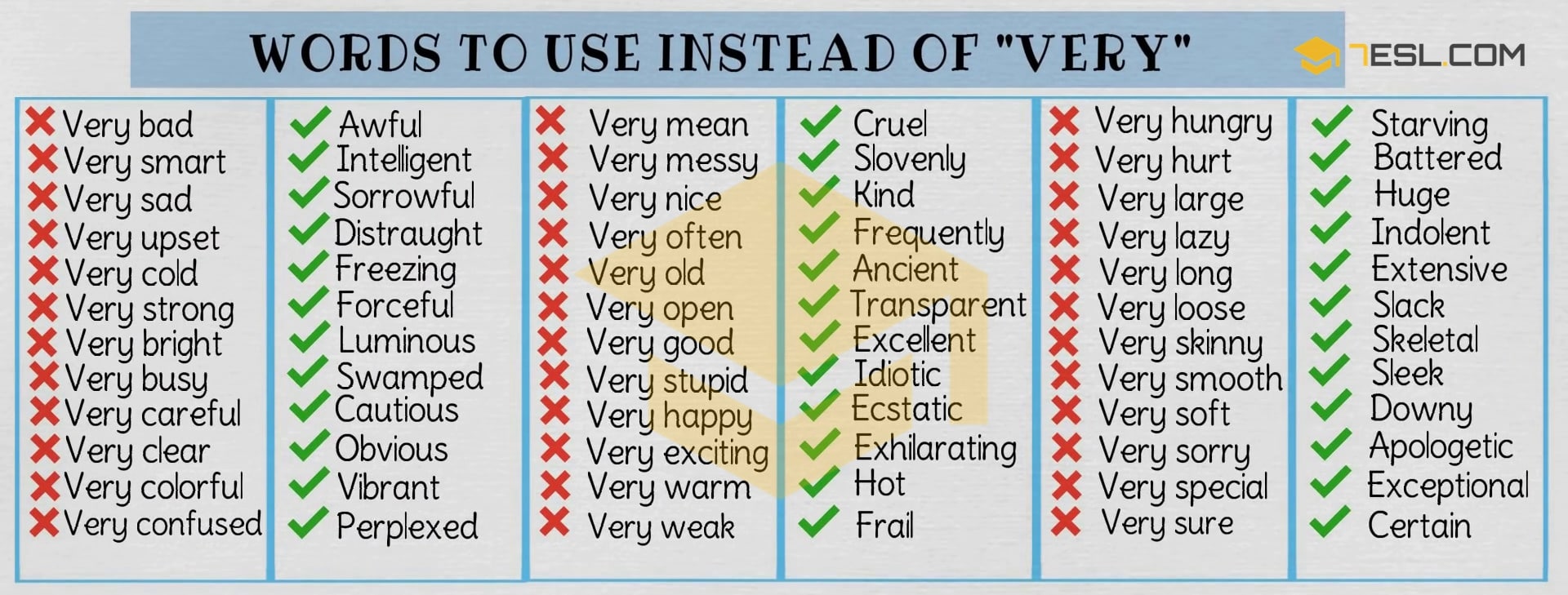
Learn list of words that you can use instead of “very” to increase your English vocabulary.
- Very angry —> Furious
- Very beautiful —> Gorgeous
- Very big —> Massive
- Very boring —> Dull
- Very noisy —> Deafening
- Very poor —> Destitute
- Very cheap —> Stingy
- Very clean —> Spotless
- Very short —> Brief
- Very difficult —> Arduous
- Very dry —> Arid
- Very quick —> Rapid
- Very bad —> Awful
- Very smart —> Intelligent
- Very sad —> Sorrowful
- Very upset —> Distraught
- Very cold —> Freezing
- Very strong —> Forceful
- Very huge —> Colossal
- Very calm —> Serene
- Very ugly —> Hideous
- Very small —> Petite
- Very funny —> Hilarious
- Very quiet —> Hushed
- Very rich —> Wealthy
- Very expensive —> Costly
- Very dirty —> Filthy
- Very tall —> Towering
- Very easy —> Effortless
- Very wet —> Soaked
- Very slow —> Sluggish
- Very good —> Excellent
- Very stupid —> Idiotic
- Very happy —> Ecstatic
- Very exciting —> Exhilarating
- Very warm —> Hot
- Very weak —> Frail
- Very little —> Tiny
- Very bright —> Luminous
- Very busy —> Swamped
- Very careful —> Cautious
- Very clear —> Obvious
- Very colorful —> Vibrant
- Very confused —> Perplexed
- Very creative —> Innovative
- Very crowded —> Bustling
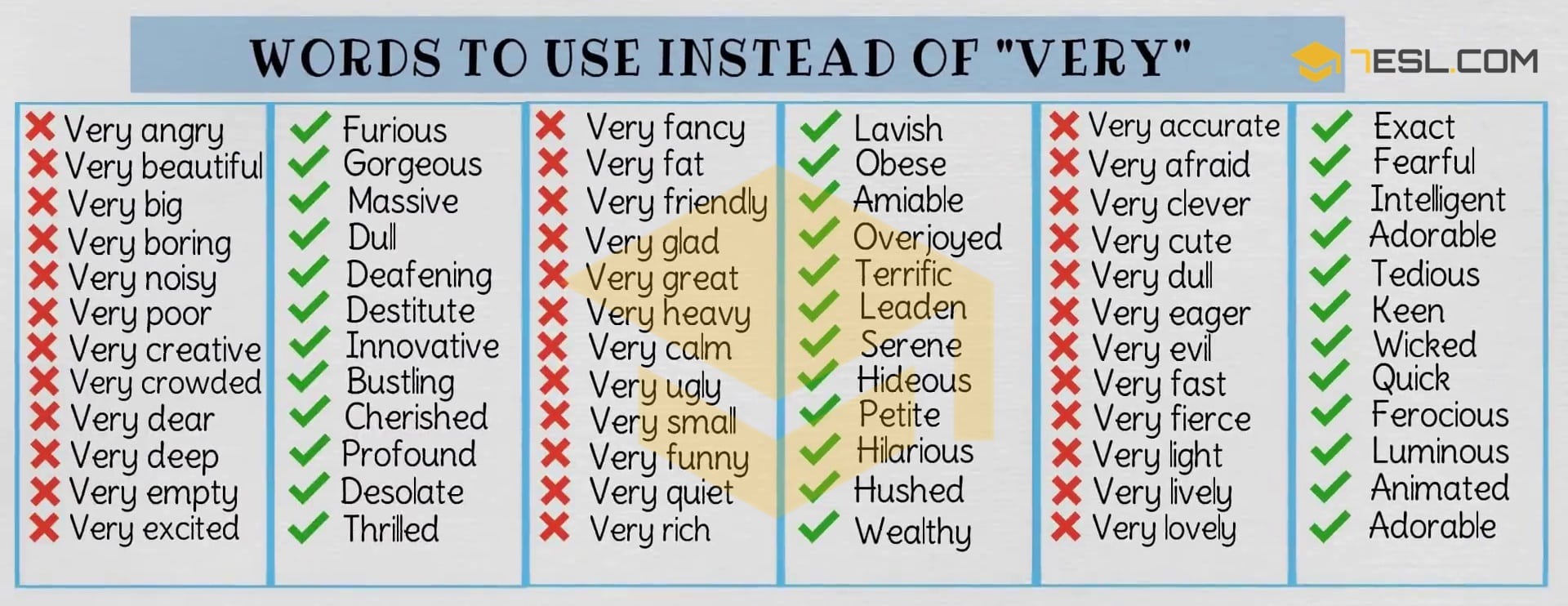
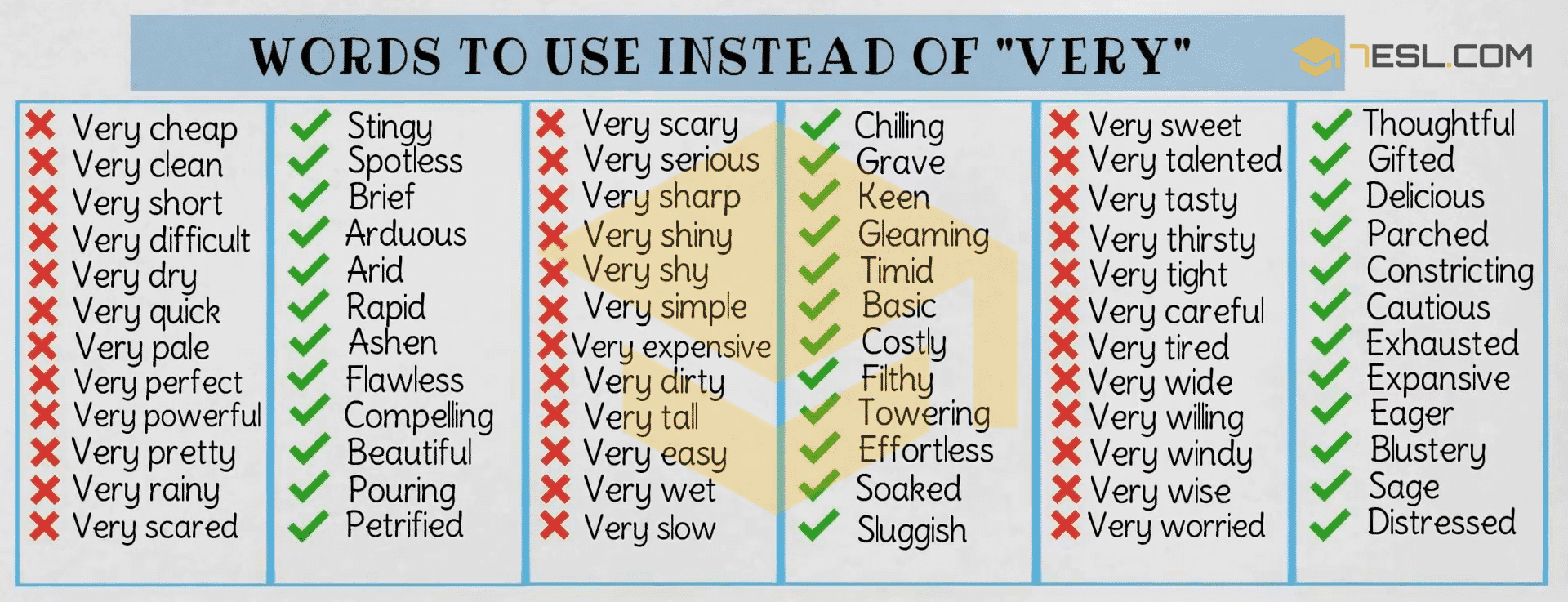
- Very dear —> Cherished
- Very deep —> Profound
- Very empty —> Desolate
- Very excited —> Thrilled
- Very fancy —> Lavish
- Very fat —> Obese
- Very friendly —> Amiable
- Very glad —> Overjoyed
- Very great —> Terrific
- Very heavy —> Leaden
- Very hungry —> Starving
- Very hurt —> Battered
- Very large —> Huge
- Very lazy —> Indolent
- Very long —> Extensive
- Very loose —> Slack
- Very accurate —> Exact
- Very afraid —> Fearful
- Very clever —> Intelligent
- Very cute —> Adorable
- Very dull —> Tedious
- Very eager —> Keen
- Very evil —> Wicked
- Very fast —> Quick
- Very fierce —> Ferocious
- Very light —> Luminous
- Very lively —> Animated
- Very lovely –> Adorable
- Very mean —> Cruel
- Very messy —> Slovenly
- Very nice —> Kind
- Very often —> Frequently
- Very old —> Ancient
- Very open —> Transparent
- Very pale —> Ashen
- Very perfect —> Flawless
- Very powerful —> Compelling
- Very pretty —> Beautiful
- Very rainy —> Pouring
- Very scared —> Petrified
- Very scary —> Chilling
- Very serious —> Grave
- Very sharp —> Keen
- Very shiny —> Gleaming
- Very shy —> Timid
- Very simple —> Basic
- Very skinny —> Skeletal
- Very smooth —> Sleek
- Very soft —> Downy
- Very sorry —> Apologetic
- Very special —> Exceptional
- Very sure —> Certain
- Very sweet —> Thoughtful
- Very talented —> Gifted
- Very tasty —> Delicious
- Very thirsty —> Parched
- Very tight —> Constricting
- Very tiny —> Minuscule
- Very tired —> Exhausted
- Very wide —> Expansive
- Very willing —> Eager
- Very windy —> Blustery
- Very wise —> Sage
- Very worried —> Distressed
Words to Use Instead of VERY | Images
List of Words to Use Instead of VERY | Image 1

Words to Use Instead of VERY | Image 2
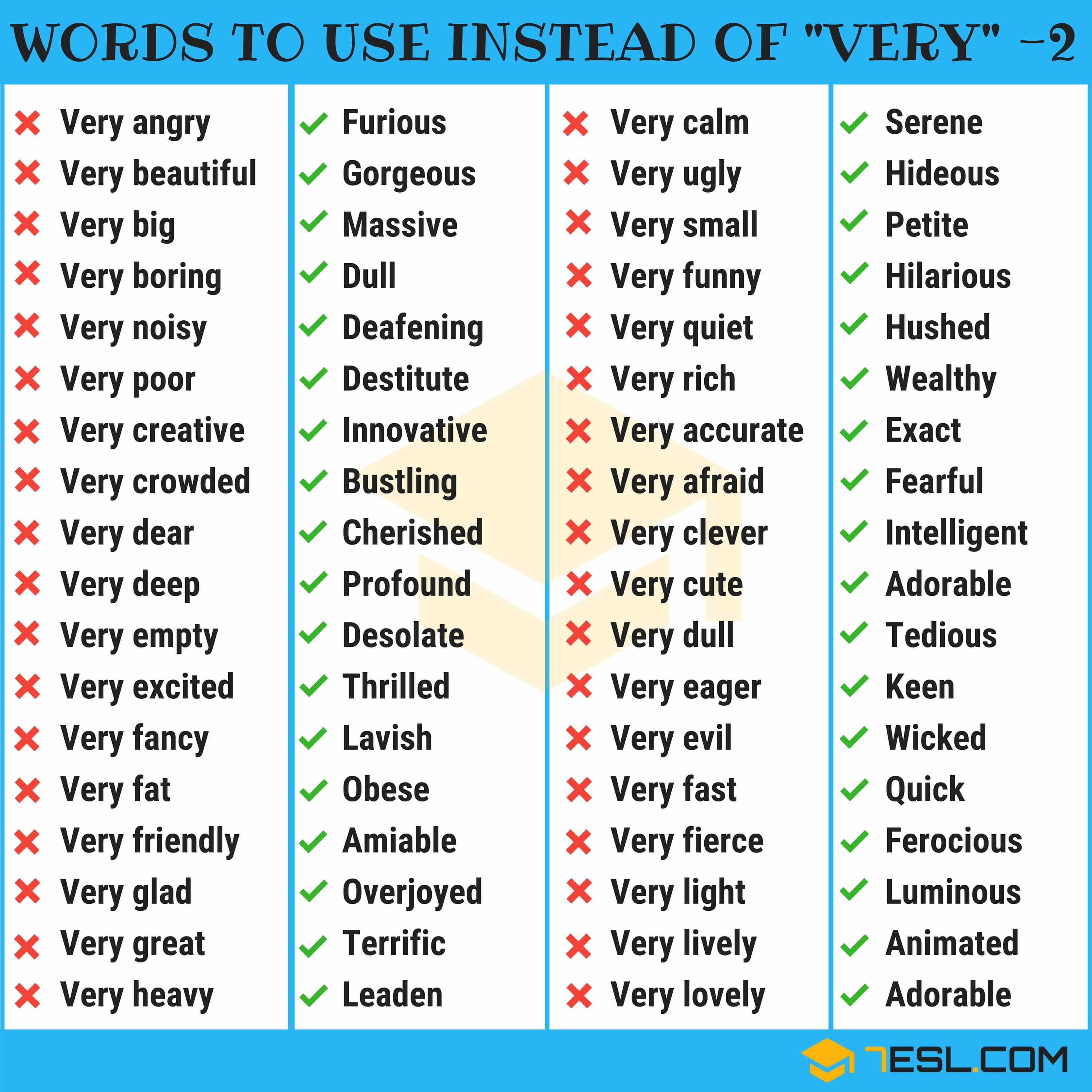
Words to Use Instead of VERY | Image 3

Ways to Avoid Using The Word Very | Videos
Last Updated on July 20, 2022
Home
Vocabulary
45 Ways to Avoid Using the Word “Very”
englishlearn_admin
20 July 2015
Vocabulary
1 Comment
45 Ways to Avoid Using the Word “Very”; instead of “very”, you can use many words. Some of them bottom;
Related Posts
Amazing Adjectives
Love Idioms in English
Some Verbs Use TO, FOR ve AT
About The Author
englishlearn_admin
One Response
-
Kojon 13 October 2016
Everything is good
Listening is very important
So post especially
While the word “very” can provide emphasis for adverbs and adjectives, it tends to be vague and unhelpful in a sentence. Making a switch to more detailed vocabulary can help make your casual conversations more dynamic, and also make it easier for others to understand what you’re trying to say. Additionally, removing or replacing the word “very” in a professional or business setting can make your conversations, deliverables, and presentations sound far more polished and put together. Try making a few simple changes to your everyday language and see if you notice a positive difference!
-
1
Opt for an emphatic adjective to describe how your day went. Try not to use boring, bland terms to sum up your day overall. While “very good” can work when you’re making small talk, try selecting words that give a more well-rounded perspective. Use words like “excellent” or “brilliant” to describe a positive day, and terms like “tedious” or “miserable” to describe a bad day.[1]
[2]
- If your day wasn’t particularly negative or positive, you can use words like “mediocre” instead of “very uneventful.”
-
2
Select specific words to describe the size of an object. While phrases like “very small” or “very big” can give a rough idea of size, you can’t get a sense of the full picture. Instead, opt for words like “giant,” “immense,” or “colossal” to describe large items, and “tiny,” “minuscule,” or “miniature” to label small things. If an object isn’t especially big or small, you can remove the “very” altogether and use basic adjectives to describe it.[3]
- For instance, a mountain or other natural landmark could be called “colossal,” while a car could be described as “large” or “big.”
Tip: Use comparisons to describe the size of an object. For instance, you could describe a pick-up truck as “bigger than a sedan.”
-
3
Describe the weather with specific adjectives. You don’t have to give your friends, family members, and acquaintances an exact temperature to describe the weather, but using terms like “very hot” and “very cold” aren’t very informative. If it’s incredibly chilly outside, opt for words like “frigid” or “freezing” to describe the weather. If it’s hot and sunny, use “scorching” or “blazing” to describe your surroundings. [4]
- For example, 90 to 100 °F (32 to 38 °C) weather could be described as scorching, while 60 to 70 °F (16 to 21 °C) may be referred to as pleasant.
-
4
Reveal your current mood with specific descriptors. Choose words that match the exact state of your mood, like “thrilled,” “ecstatic,” “depressed,” “miserable,” or “livid.” If you use a phrase like “very upset” to describe your mood, listeners may not know if you’re sad, angry, or a mixture of both emotions. Instead, choose a word that caters to the severity of your mood, whether it’s positive or negative.[5]
- For instance, you could say “I’m feeling joyful” if you’re having a great day instead of saying “I’m feeling very happy.” Similarly, saying “I’m feeling livid” carries more weight in a conversation than “I’m feeling very angry.”
-
5
Tell someone that they’re beautiful instead of very pretty. While there’s no exact right way to compliment someone, you can make someone’s day even brighter by using specific words to describe their appearance, as opposed to “very pretty” or “very nice.” Instead of using vague terms or descriptors, use specific adjectives like “gorgeous,” “brilliant,” or “stunning” to comment on a person’s striking features.[6]
- For example, saying “Your eyes are such a vibrant, beautiful green shade” or “Your whole outfit looks gorgeous” will carry a lot more weight than “You look very pretty.”
-
6
Compliment someone’s home by calling it “spotless.” When you’re a guest at someone’s home, make your small talk meaningful by pointing out how lovely their home looks. Use terms like “spotless,” “gleaming,” or “immaculate” in your compliments, or opt for words like “elegant,” “orderly,” “tidy,” or “bright.”[7]
- For instance, you could say something like: “I absolutely love your home! Your living room looks immaculate, and your throw pillows match the rug perfectly.”
-
7
Choose adjectives like “exhilarating” to describe a new experience. Avoid using terms like “very fun” or “very interesting” when talking about a recent trip, adventure, or new experience that you’ve been on. Instead, try to describe exactly how “fun” or “interesting” your experience was. Use terms like “exhilarating,” “thrilling,” “rejuvenating,” or “mentally stimulating” to describe a positive experience, and words like “unbearable,” “mind-numbing,” “insufferable,” or “unendurable” to describe a negative one.[8]
- For instance, if you went on an island vacation, you could say something like: “My vacation was so rejuvenating! I had a fantastic time snorkeling and relaxing on the beach.”
- If you had a less enjoyable experience, you could say something like: “I hate the new pizza restaurant that opened up in town. The food was disgusting, and the wait staff were rude and unbearable.”
- As you look for a better adjective, imagine yourself going one level of detail deeper and thinking of related words the way an online search engine would.[9]
-
8
Say that a pet or small child is “adorable” instead of “very cute.” Try to avoid cliches when complimenting a small child, animal, or something else that’s cute. “Adorable” is a great replacement for “very cute,” though you can make your kind statement even more meaningful with especially detailed adjectives. When commenting on a pet, use words like “charming,” “fluffy,” or “beautiful” to describe the animal. If you’re complimenting a baby or small child, terms like “darling,” “delightful,” or “precious” may be used.[10]
- For example, if you’re meeting your neighbor’s dog for the first time, you could say something like: “Your dog is such a darling! How old are they?”
-
9
Describe a meal as “tasty” or “delicious” instead of “very good.” Whether you’re eating at a restaurant or enjoying a home-cooked dish, try to think of specific, positive adjectives that describe the food you’ve just eaten. For more general compliments, you could try “yummy,” “scrumptious,” or “mouth-watering.” If you’d like to be more specific, try using descriptors like “well-seasoned,” “savory,” or “aromatic.”[11]
[12]
- Don’t say, “This steak is very good!” Instead, try saying something like, “This steak is well-seasoned and delectable.”
-
1
State that a project will be “costly” instead of “very expensive.” If you’re creating a proposal, financial plan, or some other document that involves finances, try to remove any words or phrases that have a negative financial connotation. Instead of saying “very expensive,” use terms like “costly” or “premium” as descriptors.[13]
- For example, if you’re trying to get people to invest in a new project, don’t say “This project will be very expensive,” as this might discourage possible investors. Instead, say something like, “We have a set budget for this project and want to be sure that we can afford premium materials.”
-
2
Use terms like “brief” or “extended” to describe the length of a meeting. Don’t use a term like “very long” to describe the length of a gathering, as this may be off-putting to your co-workers and superiors. Instead, opt for language that gives a general sense of the meeting’s length without setting any negative expectations. Similarly, use language like “short,” “brief,” or “quick” when describing a meeting that you’d don’t expect to take long.[14]
- For instance, say something like: “Hey everyone! Please meet in the conference room for an extended meeting on our quarterly budget. As soon as we go through the agenda, you’ll all be free to go!”
-
3
Select tactful terms like “wealthy” instead of “very rich.” In professional correspondence and formal conversations, try to keep your audience in mind. If you use terms like “very rich” or “very poor” to describe certain members of your community, they may feel uncomfortable or a bit put off. Instead, use terms like “wealthy,” “well-established,” “impoverished,” or “low-income.”[15]
- For instance, try saying something like this: “The local community center is building a new park in the lower-income side of the town.
-
4
Use words like “ongoing” when discussing a timeline. Don’t use terms like “very long” to describe the estimated deadline for a project or renovation. Instead, try to make the timeline sound manageable. Strive to give an estimated deadline when you share this kind of information as well.[16]
- For example, you could something like this: “The renovations to the high school are ongoing, and we expect them to be finished by the end of the year.”
- If you need to step away from a conversation to go to the bathroom, you could say something like: “I’ll be back shortly.”
-
5
Pick terms like “compact” when referring to size. Avoid using phrases like “very big” or “very small” to describe the size of a building or other object, as this is vague and unhelpful to the listener. Instead, think of words that describe the specifics of the property, like “expansive,” “compact,” “widespread,” “far-reaching,” or “compressed.”[17]
- For instance, saying “Your new office is compact” sounds a lot better than “Your new office is very small.”
-
1
Delete any instances of “very” from your writing. Read through your email, memo, academic paper, or other professional document that you plan on sending or submitting. Search your writing for any instances of “very,” and try to delete or replace the word whenever possible. If you use “very” too often, your message could appear juvenile or casual, and the recipient might not take you seriously.[18]
- If you’re working on a digital device, try using the “find” feature to highlight specific words in your text.
- For instance, instead of saying “The research is very promising in the field of biology,” say something like “The research is intriguing to many biologists” instead.
- If you were writing a professional email, you could say “I’m eager to work with you,” as opposed to “very excited.”
-
2
Don’t replace “very” with overly dramatic words. When removing or switching out “very” in a sentence, try not to use words that exaggerate or misinform the reader. Instead, choose a word that matches the emphasis that “very” would have added to the sentence.[19]
- For instance, if the original sentence was “The theory is very convincing,” don’t use “irrefutable” as a replacement word for “very convincing.” Instead, say that “The theory is convincing.”
-
3
Avoid replacing “very” with other intense qualifiers. Don’t switch out “very” with another word that serves the same purpose, like “especially” or “severely,” as these words will make your writing sound unprofessional and juvenile. Instead, replace “very” with a more descriptive word that fits better into the sentence.[20]
- For example, instead of saying, “The boat was especially large,” you could say, “The boat was enormous.”
-
4
Use “very” sparingly in your creative writing. As a general rule of thumb, try to remove and replace “very” in your creative drafts and use a more engaging adjective or adverb instead. If you use words like “very” too often in your writing, your text could come off as lazy or unengaging. Instead, choose words that help paint a clear picture for your reader.[21]
[22]
- For instance, instead of saying “The man was very tired after a long day of work,” you could say, “The man was exhausted after a long day of work.”
- Avoid similar «dead words» like «good» and «bad.»[23]
- Dead words don’t give you a lot of detail or information.
Ask a Question
200 characters left
Include your email address to get a message when this question is answered.
Submit
References
About this article
Thanks to all authors for creating a page that has been read 2,905 times.










